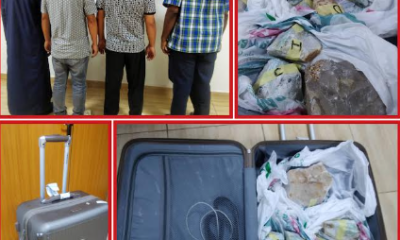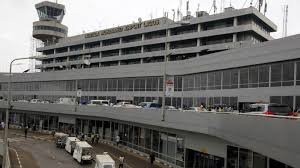Nigeria and Ghana have stepped up security and safety architectures at their airports as part of measures to check attacks and sinister incidents.
Just as the Federal Government has authorised the use of arms by the civilian aviation security personnel employed by the Federal Airports Authority of Nigeria (FAAN), Mrs Ursula Owusu-Ekuful, the Minister of Communications, has inaugurated seven biometric e-Gates at the International Arrival Hall of the Kotoka International Airport (KIA).
National Daily gathered that two e-Gates are being installed at the Departure Hall, while in the near future others would be installed at the new Terminal Three after Airport construction works are completed.
The e-Gates provide automatic border control solution and ease peak traffic workload for immigration.
The e-Gates allow travellers to use their passports to automatically enter and exit the country and it would also cater for Registered Traveller Programmes and for regular passenger processing.
Already, the Minister of Communications, Mrs. Ursula Owusu-Ekuful, has inaugurated seven biometric e-Gates at the International Arrival Hall of the Kotoka International Airport (KIA).
This new system would be replacing the PISCES System, which only does identification.
The new system also supports the functionality of boarder control by performing identification, authentication and verification.
The entire project costs $18 million and is being sponsored by the Communications Ministry.
Here in Nigeria, the Minister of State for Aviation, Capt. Hadi Sirika, revealed the new arms carrying airport security policy at the 2018 retreat organised by Aviation Security (AVSEC) personnel in Katsina, Katsina State.
Sirika saidthat “The Federal Government has given approval for aviation security (AVSEC) to bear arms which is a notable achievement in this administration’s effort at improving the general safety of its citizenry and passengers passing through our airports”.
“Arming AVSEC will ensure proper policing of the sector by AVSEC personnel. This is part of efforts by the President Muhammadu Buhari administration to give the country dividends of democracy,” he added.
According to him, “The policy would complement the jobs of other airport security organisations in view of the growing threats to the Nigerian aviation industry”.
“This was aimed at assisting not only in the war against terrorism but provides a special class of professionally trained AVSEC unit through the training of 30 selected aviation security master trainers who will in turn train others.

 Entertainment5 days ago
Entertainment5 days ago
 Health1 week ago
Health1 week ago
 Health4 days ago
Health4 days ago
 Football1 week ago
Football1 week ago
 Football1 week ago
Football1 week ago
 Crime4 days ago
Crime4 days ago
 Education6 days ago
Education6 days ago
 Crime1 week ago
Crime1 week ago




